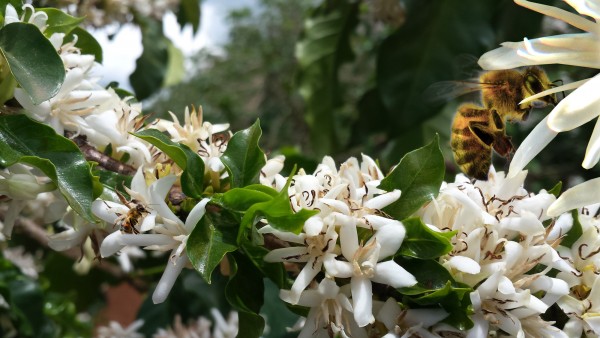
Pollination is one of the essential environmental services provided to the ecosystem. Pollination vectors are extremely valuable for the ecosystem, enabling pollen transportation—that is, the transfer of pollen from the male (anther) to the female part of the flower (stigma).
Pollination represents the production process of vegetables that are not self-pollinating. It is through pollination that fecundation takes places and, consequently, the formation of fruits and seeds that will originate new plants. There are several pollinating agents, including birds, bees, butterflies, wasps and other living beings that visit flowers as a source of food or that have access to them because they are close to their natural habitat.
As an environmental service, pollination brings countless benefits, playing an important role in food production and agriculture, as well as in scientific development, culture, recreation and in the conservation of the biological diversity.
Pollination is essential for plant sexual reproduction and, in its absence, genetic variability cannot be maintained. Farming production is frequently decreased, or fruits are deformed (because of insufficient pollination and not because of insufficient use of agrichemical inputs). In the case of natural systems, detecting insufficient pollination effects is much more subtle than in farming systems, but consequences can be quite severe, such as the extinction of an herbal organism, visible decline of animals that feed from fruits and seeds, or weak flora regeneration, among many others.
In ecological importance, pollinating insects can be regarded as leading agents to support and attain several farming crops, contributing for the increase of flora genetic diversity, seed development, increased production and enhancement of the physical properties and characteristics of the food produced. Approximately 90% of the flower species throughout the world depend on biotic pollination for reproduction and maintenance of genetic variability. Pollination is considered extremely important for biodiversity preservation and our own survival. In Brazil, 85 out of 141 farming crops depend on pollinators. If pollinators disappeared, only cultures with abiotic pollination would survive, that is, rice, soybeans, corn and a few others.
That is, food production and availability would be terribly affected. Therefore, attention is required. The absence of pollinators would bring a series of negative impacts to the environment and, consequently, to food production.
When thinking about pollinators in agriculture, bees are the first animals that come to mind, the most popular being is the Apis mellifera, currently present on all continents. There are, however, other wild pollinators—indeed, Brazil features vast biological diversity of social insects.
Several farming crops may be mentioned as dependent on biotic pollination: apples, acai berries, acerola fruit, passion fruit, and Brazilian nuts need bees to produce perfect fruit. In the case of coffee, canola, soybeans, strawberries, tomatoes and other farming crops, pollination is not a must, but crop yield will be much greater in the presence of pollinators. According to researchers in the pollinators-agriculture interaction area, pollinated fruit have more seeds, more fruit homogeneity, more uniform format, higher nutritional and longer shelf life. Regarding coffee, studies conducted by the Research Network for Pollinator Conservation and Sustainable Management, coordinated by Professor Blandina Viana, from the Federal University of Bahia, show that a greater number of bees in a crop may increase producers’ yield by up to 30%, in addition to bringing other benefits, such as grain uniformity. In the studies developed in Chapada Diamantina, there was evidence that just having the Apis mellifera bee visit coffee flowers is enough to deposit pollen grains in the flower stigma, which will in turn yield heavier and better-quality fruit. Flowers not visited by these bees, however, will produce fruit with more variable size and weight (large and small), which decrease average productivity. Places with a greater variety of environments, with a balanced ratio between agriculture and natural vegetation, have a larger diversity of resources such as food and shelter. Also, more bee species were found visiting flowers in these places.
Cecafé has been studying proposals to develop several partnerships in projects to protect pollinators and to enable apiculture and agriculture to co-exist in harmony.
Marcos Matos – CECAFÉ CEO
Lilian Vendrametto – CECAFÉ Sustainability Manager


Leave A Comment